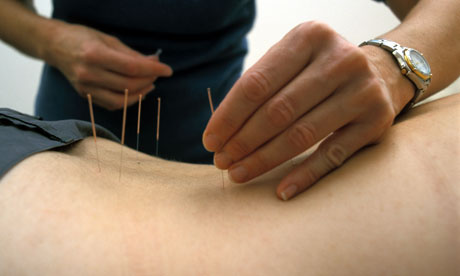
Pregnant women hoping to give birth without drugs have been known to adopt any number of natural remedies, from water baths to self-hypnosis and extreme screaming, to minimise the agony of labour.
But a study published today finds there is no evidence that acupuncture, another popular complementary therapy, reduces the pain of childbirth.
Experts say growing numbers of pregnant women are turning to the practice, which involves needles being inserted into the skin to relieve pain. But research suggests it does not work during labour.
The finding, which has already prompted a vigorous debate about the value of acupuncture, came from British and Korean researchers who examined previous studies of its use in labour.
"The results show that there is little convincing evidence that women who had acupuncture experienced less labour pain than those who received no pain relief, a conventional analgesia, a placebo or sham acupuncture," researchers told BJOG: An International Journal of Obstetrics and Gynaecology. The journal is owned by the Royal College of Obstetricians and Gynaecologists, which represents most of the UK's doctors specialising in childbirth and maternity care.
Prof Edzard Ernst, of the Peninsula medical school at Exeter and Plymouth Universities and co-author of the report, said: "The effects of acupuncture perceived by women are largely due to placebo. Acupuncture has many qualities that maximise placebo effects: it involves touch and is invasive and, psychologically, is attached to the mysticism of the east."
Prof Philip Steer, BJOG's editor-in-chief, said labour pain can be so intense that a women would do anything to minimise it.
"Acupuncture is a drug-free approach and that may explain why some women prefer its use during labour. This review shows that in a very small number of cases acupuncture may be of help, usually for short periods of time after treatment, and this may be down to psychological rather than a physiological effect. Generally the consensus is that the evidence does not support its use."
The only benefits were 11% less pain in the first 30 minutes after receiving acupuncture and a need for less pharmacological pain relief, the authors say.
The researchers found that acupuncture did not seem to be any more effective than sham acupuncture, conventional drug-induced pain relief or no pain relief. When women reported the amount of pain they were feeling while using acupuncture, it was similar to the pain levels recounted by women using these other methods.
But critics said the research ignored the real benefits that women in labour felt they had received.
"As a practising acupuncturist and midwife I've seen very good results in the past when using acupuncture for pain relief during labour," said Sarah Budd, a midwife and acupuncturist at the Derriford hospital in Plymouth.
"Our experience is that women are looking for alternatives to drugs and intervention such as epidurals, and certainly the women I have treated report a very high satisfaction rate from acupuncture treatment during labour with very little use of other pain relief methods."
Siobhain Freegard, co-founder of the Netmums website, said it was more important that some women who used acupuncture found it useful than that it was scientifically proven to work.
"If acupuncture helps a women endure the pain of childbirth and feel more relaxed and more in control of what's happening to her, then it's worthwhile, even if those benefits are mainly psychological," she said. "Pain is largely in the mind; it's not something you can see and touch. Childbirth is a combination of the psychological, emotional and physical. If acupuncture works on any of those levels, it's worthwhile."
Freegard added that women who used acupuncture with their first birth often use it their second time.
Mike O'Farrell, chief executive of the British Acupuncture Council, said: "We're surprised by these findings as previous trials, along with the evidence that our members see in their practices every day, suggest that acupuncture can be effective in providing pain relief in many different circumstances."

